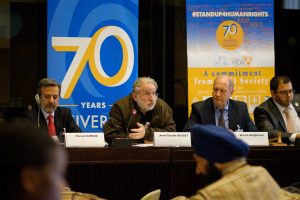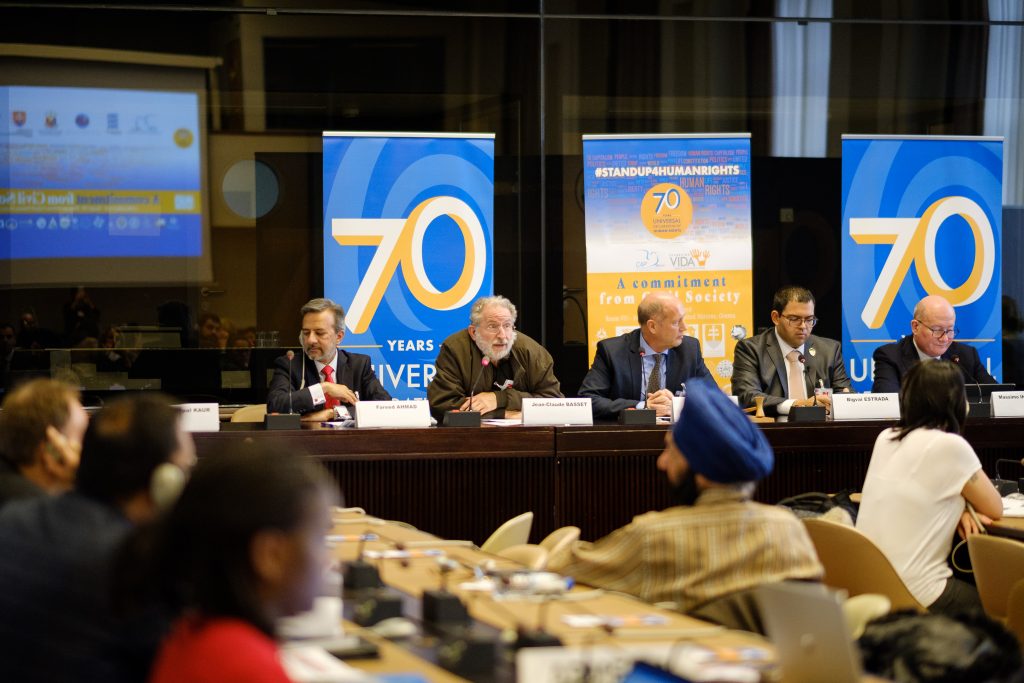 What is a « Faith based organization »? Actually, it is a very practical catch-all, but certainly not or not only a confessional organization as the usual French translation says. I have no fully satisfactory alternative, but I will speak of an organization based on a faith or, more in conformity with the French-speaking sensibilities, an organization that is religiously inspired or even that has a spiritual basis. What seems important to me at this stage is to distinguish at least three types of organization under this label:
What is a « Faith based organization »? Actually, it is a very practical catch-all, but certainly not or not only a confessional organization as the usual French translation says. I have no fully satisfactory alternative, but I will speak of an organization based on a faith or, more in conformity with the French-speaking sensibilities, an organization that is religiously inspired or even that has a spiritual basis. What seems important to me at this stage is to distinguish at least three types of organization under this label:
1- the religious community with its own creed, cult life and organization; large or small, old or recent, it is characterized in particular by the distinction between members and non-members
2- the NGO-type organization based on a conviction and/or an objective with a religious dimension; in practice, it maintains more or less close or distended links with its origins
3- the association, often a local one, initiated by believers with a specific objective in relation to the society to which it intends to contribute.
When it comes to the commitment of these faith-based organizations in relation to the Universal Declaration of Human Rights, three distinctions seem important to me:
– depending on whether these organizations are based on one or more religious, cultural or philosophical traditions;
– depending on whether they have one or more objectives with a religious or humanitarian nature; one does not exclude the other, but requires a necessary but difficult articulation between the two.
– depending on whether or not they include people with different religious or humanist beliefs in their activity, as well regarding the actors than the target audience.
But then, what are the advantages and requirements of a recognition as a faith-based organization that is not a legal notion, but falls within the more general category of non-profit association.
I will mention respectively:
1- to obtain a social recognition, beyond the affiliated members. This is particularly true for the minority traditions in a given context and in general for what are called new religious movements.
2- to benefit from the abolition or reduction of state taxes, depending on the different relations existing between the State and the religions, which vary from one country to another.
3- to receive a financial support (legacies, donations from non-members, government grants and funds received from another organization that does not share the same religious motivations but rather humanitarian objectives;
Under the requirements or limitations, I see:
1- the clarity required in terms of motivation as well as objectives, towards partners and the public in general.
2- the moral requirement to comply with the objectives of the UN Charter and more specifically the 30 articles of the Universal Declaration of Human Rights.
3- finally, the need for transparent accounts on the use of received money, particularly coming from sources outside of the organization.
That said, the importance and effectiveness of organizations linked with a religious trend are widely recognized by bodies such as the World Bank, which in 2014 relaunched its commitment to faith-based organizations and religious communities, “recognizing that they often do essential work on the front lines of combating extreme poverty, protecting vulnerable people, providing essential services and reducing suffering”.
Faith-based organizations committed to the UDHR
I thought it would be useful to make these distinctions before addressing directly the subject of our round table: Faith based organizations committing to the UDHR, which concerns in priority NGOs with a religious base such, as Caritas Internationalis (1897-D), Islamic Relief Worldwide (1984-GB), World Council of Churches (1948-NL), ATD Fourth World (1968-F), World Conference of Religions for Peace, renamed Religions for Peace (1970-Kyoto) to name but a few.
It goes without saying, and even better by saying it, that this commitment to respect Human Rights concerns religious communities as such, both in their internal functioning and in their actions targeting an audience that is not part of them. This is just as true for all initiatives related in one way or another to a religious community, old or new.
It is my conviction that faith-based organizations willing to commit to Human Rights must strive to apply Human Rights within their own institutions with as much force and conviction as they can bring to their dissemination to a wider audience. It is this first aspect of the role of faith-based organizations in the concrete implementation of Human Rights that I would like to highlight, leaving it to the other speakers at this round table to illustrate the engagement in the society.
When we talk about Human Rights, we naturally think of the Universal Declaration of Human Rights adopted by the UN General Assembly in 1948 in Paris with its first article which states that “All human beings are born free and equal in dignity and rights. They are endowed with reason and conscience and must act towards each other in a spirit of brotherhood.” And its Article 18 on Religious Freedom “Everyone has the right to freedom of thought, conscience and religion; this right includes freedom to change his religion or belief and freedom to manifest his religion or belief, alone or in community with others, in public as well as behind closed doors, in teaching, practice, worship and observance”. Article 19 on Freedom of Opinion can be added, but it should not be forgotten that the Charter of the United Nations includes seven times that making the promotion and protection of Human Rights is a primary objective and guiding principle of the United Nations.
Indeed, the United Nations has gradually developed a series of instruments to clarify and deepen the scope of these rights. With regard to the direct or indirect engagement of faith-based organizations, I would like to mention:
– the International Covenant on Civil and Political Rights (1966), article 18 of which, with its 4 paragraphs, is much more explicit on the interpretation to be given to religious freedom; this includes the freedom to believe or not to believe and the limits of that freedom
– the International Covenant on Economic, Social and Cultural Rights (1966), which deals with the responsibility of the States in promoting these rights
– the Convention on the Elimination of All Forms of Discrimination against Women (1969) raises the issue of the status and place of women in religious organizations
– the Declaration on the Elimination of All Forms of Intolerance and Discrimination Based on Religion or Belief (1981) with its Special Rapporteur, who gives the measure, year after year, of the gap between principles and reality; here the issue is that of intolerance towards other religious traditions in which religious communities are involved – exclusion or hate speech – and, more generally, discrimination between members and non-members of the community
– the Convention against Torture and Other Cruel, Inhuman or Degrading Treatment or Punishment (1984) if States are concerned in the first place, this raises the question of the role of religious or cultural traditions in the legitimization and application of cruel or inhuman acts
– the Convention on the Rights of the Child (1989) this concerns the question of the right of children to follow or leave their parents’ religion and the rites imposed on them
– the Convention on Indigenous and Tribal Peoples (1989) the issue is the contempt for so-called primitive or ethnic traditions by the so-called great monotheistic, pantheistic or monistic traditions; and also the place that these traditions find or not in interreligious dialogue
– the Declaration on the Rights of Persons Belonging to National or Ethnic, Religious and Linguistic Minorities (1992); this concerns primarily religious organisations in a dominant position but also minorities within a given tradition and the defence of the rights of all minorities without distinction as to origin, belief, social status, sex and sexual practices.
The principle of equality and freedom, non-discrimination and right to difference, in the name of the common humanity, are as many subjects to which any organization concerned with Human Rights, whether or not it has a religious basis, is called upon to confront its values and its practice. It is precisely on this path that the United Nations High Commissioner for Human Rights (OHCHR) has embarked on. The outcome was the Beirut Declaration on “Faith for Rights “* adopted in March 2017 at a meeting in Beirut that brought together representatives of civil society and organizations concerned with faith and Human Rights. This is certainly a good illustration of what faith-based organizations can do to make Human Rights real and concrete.



